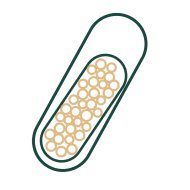Its absorption into the body requires the presence of hydrochloric acid and combination with a substance produced by the stomach (the intrinsic factor). It is then stored by the liver, pancreas, heart and brain. In view of its storage, a vitamin B12 deficiency can only appear after a certain period and in specific circumstances. It is seen most often in people with a vegan diet, those with chronic intestinal diseases, people who have undergone bariatric surgery (malabsorption problem), in the event of pernicious anaemia (an immune disease) or in the elderly due to reduced intestinal absorption.
A deficiency can produce different symptoms, such as anaemia, pins and needles in the hands and feet, constipation interspersed with diarrhoea, or weight loss. An insufficient intake causes anaemia, mood problems and, among the elderly, reasoning and memory problems. Vitamin B12 does not seem to present any risks, even at high doses. Very high doses may aggravate acne, so care should be taken by teenagers.
The daily recommended dose for women is 0.4 μg/day. However, it should be increased to 0.45 μg/day in pregnant women and 0.5 μg/day during breastfeeding.
Good for
Nervous system health and energy


